11 Best Herbal Tinctures For Runny Nose

Herbal tinctures for Runny nose are liquid extracts made from various herbs and plants that are used to treat congestion and nasal discharge.
These natural remedies offer several benefits, including reducing inflammation, soothing irritated nasal passages, and providing relief from excessive mucus production.
Some popular herbal tinctures used to treat runny nose include Echinacea, which boosts the immune system and fights off infections; Eucalyptus, which helps to clear mucus and ease congestion; Peppermint, which cools and calms the nasal passages; Ginger, which reduces inflammation and soothes the throat; Sage, which helps to dry up mucus and reduce congestion; and Licorice root, which has anti-inflammatory properties and aids in soothing a sore throat.
By incorporating these herbal tinctures into your treatment plan, you can find natural relief from the symptoms of a runny nose and promote overall health and well-being.
According to "Pharmaceuticals (Basel, Switzerland)", tinctures for runny nose can be used as a local treatment to clear the airways and relieve nasal congestion, as part of the symptomatic treatment of the common cold.
Below there's a list of the 11 best herbal tinctures for runny nose.
- 1. Eucalyptus globulus tinctures
- 2. Echinacea purpurea tinctures
- 3. Echinacea angustifolia tinctures
- 4. Echinacea pallida tinctures
- 5. Cinchona officinalis tinctures
- 6. Ginkgo biloba tinctures
- 7. Zingiber officinale tinctures
- 8. Sambucus nigra tinctures
- 9. Thymus vulgaris tinctures
- 10. Rosmarinus officinalis tinctures
- 11. Melissa officinalis tinctures
Also you may be interested in...
TODAY'S FREE BOUNDLE
Herb Drying Checklist + Herbal Tea Shopping List + Medicinal Herbs Flashcards
Enter you best email address below to receive this bundle (3 product valued $19.95) for FREE + exclusive access to The Aphotecary Letter.
$19.95 -> $0.00
1. Eucalyptus globulus tinctures
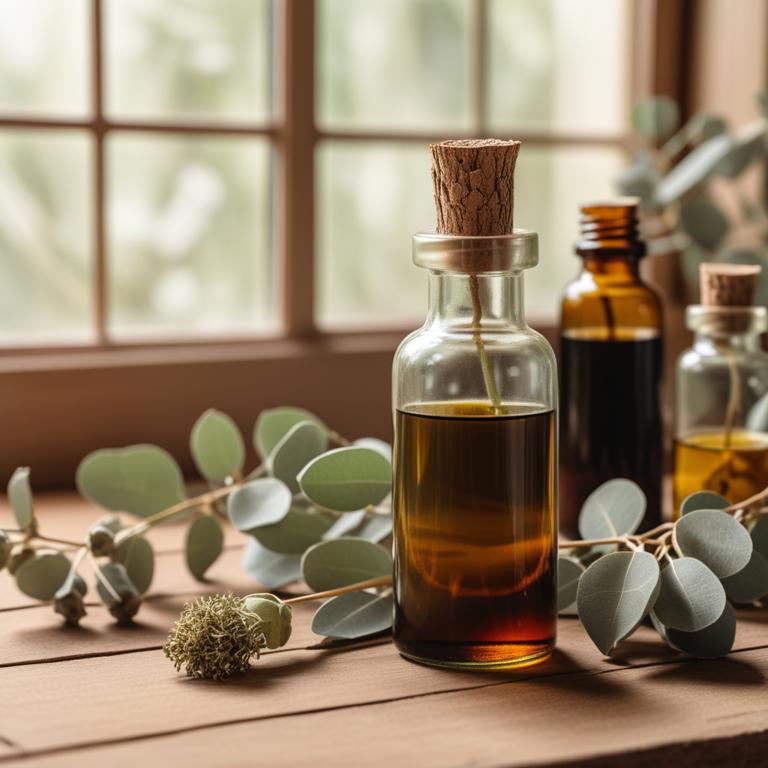
Eucalyptus globulus tinctures have been traditionally used to treat runny nose, also known as rhinorrhea, due to their decongestant and anti-inflammatory properties.
The bioactive constituents present in Eucalyptus globulus tinctures, such as eucalyptol, menthone, and limonene, help to reduce nasal congestion and inflammation by inhibiting the production of pro-inflammatory mediators and promoting the clearance of mucus from the nasal passages.
These constituents also exhibit antimicrobial properties, which can help to combat underlying infections that may be contributing to the runny nose.
Regular use of Eucalyptus globulus tinctures has been shown to provide relief from runny nose symptoms, promote a healthy respiratory system, and enhance overall well-being.
Related Study
According to "Turkish archives of otorhinolaryngology", Eucalyptus globulus tinctures may be effective in treating runny nose as a component of the herbal preparation Sinulan forte, which showed significant improvement in rhinorrhea (runny nose) symptoms when compared to mometasone furoate nasal spray.
2. Echinacea purpurea tinctures

Echinacea purpurea tinctures have been traditionally used to treat the runny nose ailment, known as rhinitis, due to their anti-inflammatory and immunomodulatory properties.
The bioactive constituents, including alkylamides and phenolic acids, help to reduce inflammation and congestion in the nasal passages, thereby alleviating symptoms such as a runny nose and sneezing.
These constituents also possess antimicrobial properties, which help to prevent infections and promote healing in the nasal mucosa.
Regular use of Echinacea purpurea tinctures may provide relief from rhinitis symptoms and support overall respiratory health, making it a popular herbal remedy for this common condition.
Related Study
According to "The Cochrane database of systematic reviews", Echinacea purpurea tinctures may be better than a placebo in treating the common cold, which may include symptoms such as runny nose, but there is not enough evidence to recommend a specific product.
3. Echinacea angustifolia tinctures

Echinacea angustifolia tinctures have been traditionally used to treat the runny nose ailment, known as rhinitis, due to their anti-inflammatory and antihistaminic properties.
The bioactive constituents of Echinacea angustifolia, including alkylamides, caffeic acid derivatives, and polyphenols, help to reduce inflammation and alleviate symptoms of runny nose by inhibiting the release of histamine and other chemical mediators.
This herbal preparation helps to treat the runny nose ailment by modulating the immune system and reducing mucus production, providing relief from congestion, sneezing, and nasal discharge.
The benefits of Echinacea angustifolia tinctures for treating runny nose include natural and non-invasive relief from symptoms, reduced risk of side effects, and potential long-term immune system support.
Related Study
According to "The Cochrane database of systematic reviews", Echinacea angustifolia tinctures may be better than a placebo in treating runny nose, as suggested by the results of the included trials.
4. Echinacea pallida tinctures

Echinacea pallida tinctures have been traditionally used to treat the runny nose ailment due to their anti-inflammatory and immunomodulatory properties.
This herbal preparation helps to treat the condition by reducing nasal congestion and modulating the immune system's response to allergens and irritants, thereby alleviating symptoms such as runny nose and sneezing.
The bioactive constituents of Echinacea pallida tinctures, including alkylamides, caffeic acid derivatives, and polysaccharides, are responsible for its therapeutic effects, which include antioxidant and anti-inflammatory activities.
The benefits of using Echinacea pallida tinctures to treat the runny nose ailment include natural and non-invasive relief from symptoms, reduced reliance on over-the-counter medications, and potential prevention of respiratory tract infections.
5. Cinchona officinalis tinctures

Cinchona officinalis tinctures have been traditionally used to treat the runny nose ailment due to their anti-inflammatory and antipyretic properties, which help to reduce nasal discharge and alleviate congestion.
The bioactive constituents present in Cinchona officinalis, including quinoline alkaloids such as quinine and cinchonine, help to constrict blood vessels and reduce inflammation, thereby relieving nasal congestion and runny nose symptoms.
These herbal preparations also possess antimicrobial properties, which help to combat underlying infections that may contribute to the development of a runny nose.
The benefits of using Cinchona officinalis tinctures to treat a runny nose include rapid relief from symptoms, reduced risk of complications, and a natural alternative to conventional medications.
Related Study
According to "Turkish archives of otorhinolaryngology", Cinchona officinalis tinctures may help alleviate runny nose symptoms, as they are part of the herbal preparation Sinulan forte, which demonstrated better relative improvement in rhinorrhea compared to mometasone furoate nasal spray therapy.
6. Ginkgo biloba tinctures

Ginkgo biloba tinctures have been traditionally used to treat runny nose due to their anti-inflammatory and antihistamine properties, which help to reduce nasal congestion and alleviate symptoms associated with allergies.
The bioactive constituents of Ginkgo biloba, including flavonoids and terpenoids, work together to inhibit the release of histamine, a key player in allergic reactions, thereby providing relief from runny nose.
The benefits of using Ginkgo biloba tinctures to treat runny nose include reduced nasal discharge, improved breathing, and a decrease in the frequency of sneezing and coughing.
By utilizing the natural antihistamine and anti-inflammatory properties of Ginkgo biloba, individuals can effectively manage symptoms of runny nose and promote overall respiratory health.
Related Study
According to "American journal of health-system pharmacy : AJHP : official journal of the American Society of Health-System Pharmacists", Ginkgo biloba tinctures are potentially safe for use, although no specific information is provided in the study about their effectiveness for runny nose.
7. Zingiber officinale tinctures

Zingiber officinale tinctures have been used traditionally to treat runny nose due to their decongestant and anti-inflammatory properties, which help to reduce nasal congestion and alleviate symptoms associated with allergies and colds.
The bioactive constituents of Zingiber officinale tinctures, including gingerols and shogaols, work together to inhibit the production of pro-inflammatory enzymes and mediators, thereby reducing the severity of runny nose.
By reducing inflammation and congestion in the nasal passages, Zingiber officinale tinctures help to relieve the discomfort and distress associated with runny nose, making it easier to breathe and recover from illness.
The benefits of using Zingiber officinale tinctures to treat runny nose include their natural origin, non-addictive properties, and potential to prevent the development of antibiotic-resistant bacteria.
Related Study
According to the given study, Zingiber officinale tinctures may potentially alleviate symptoms of runny nose, as it is one of the medicinal plants with therapeutic value in treating respiratory conditions.
8. Sambucus nigra tinctures
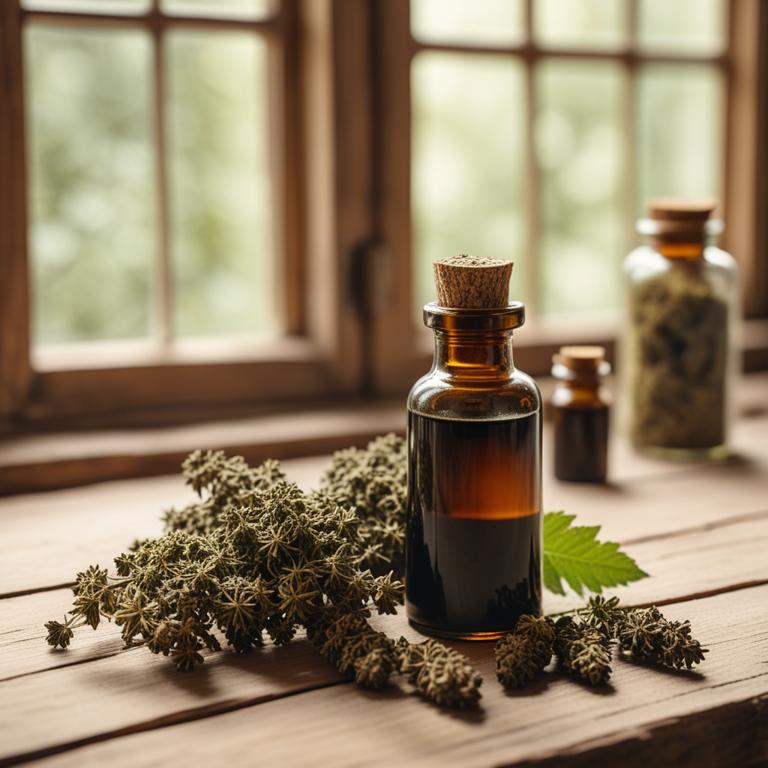
Sambucus nigra tinctures, derived from the elderberry plant, have been traditionally used to treat runny nose and alleviate respiratory issues.
The properties of this herbal preparation help to reduce inflammation and combat infections, making it an effective treatment for colds and flu.
The bioactive constituents of Sambucus nigra tinctures, including flavonoids, anthocyanins, and phenolic acids, exhibit antioxidant and anti-inflammatory properties that help to soothe and dry up a runny nose.
The benefits of using Sambucus nigra tinctures to treat runny nose include rapid symptom relief, improved immune function, and reduced risk of complications from respiratory infections.
9. Thymus vulgaris tinctures
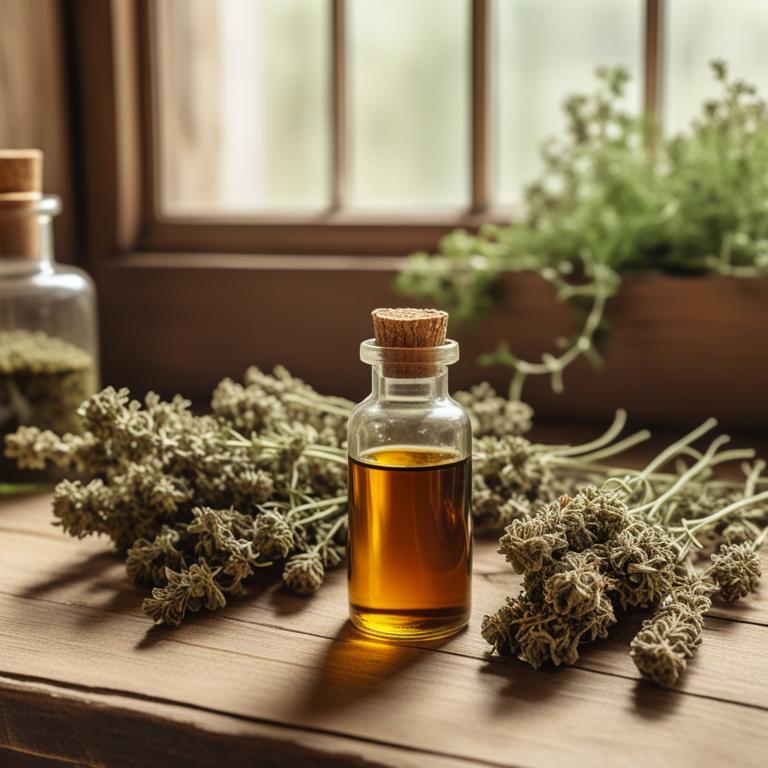
Thymus vulgaris tinctures have been traditionally used to alleviate the symptoms of a runny nose, such as excessive mucus production and congestion, due to their decongestant and anti-inflammatory properties.
The tinctures help to treat this ailment by reducing the swelling of mucous membranes and loosening mucus, making it easier to expel.
The bioactive constituents of Thymus vulgaris, including thymol and carvacrol, exhibit antimicrobial and antiviral activities that help to combat underlying infections that may be contributing to the runny nose.
By using Thymus vulgaris tinctures, individuals can benefit from their natural and non-invasive approach to managing a runny nose, without the risk of side effects associated with conventional medications.
10. Rosmarinus officinalis tinctures
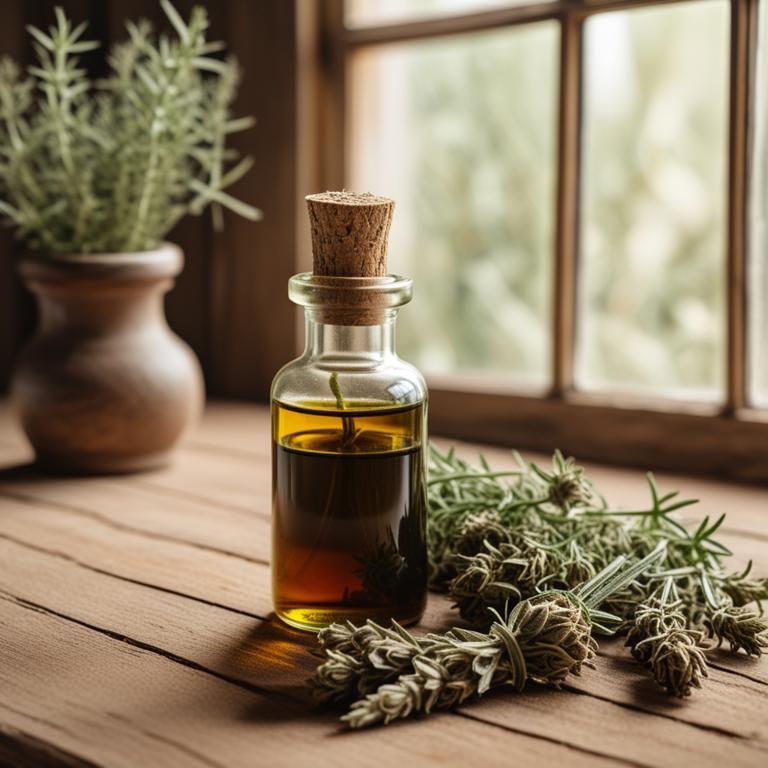
Rosmarinus officinalis tinctures, derived from the leaves of the rosemary plant, have been traditionally used to treat the runny nose ailment, commonly known as rhinorrhea.
The properties of this herbal preparation that help to treat this ailment include its antimicrobial and anti-inflammatory properties, which help to soothe and protect the nasal passages.
The bioactive constituents of rosemary, such as camphor, bornyl acetate, and borneol, have been shown to help reduce nasal congestion and alleviate symptoms of rhinorrhea by reducing inflammation and promoting relaxation.
The benefits of using rosemary tinctures to treat runny nose include natural relief from congestion and sinus pressure, reduced risk of infection, and a decrease in the need for over-the-counter medications.
11. Melissa officinalis tinctures
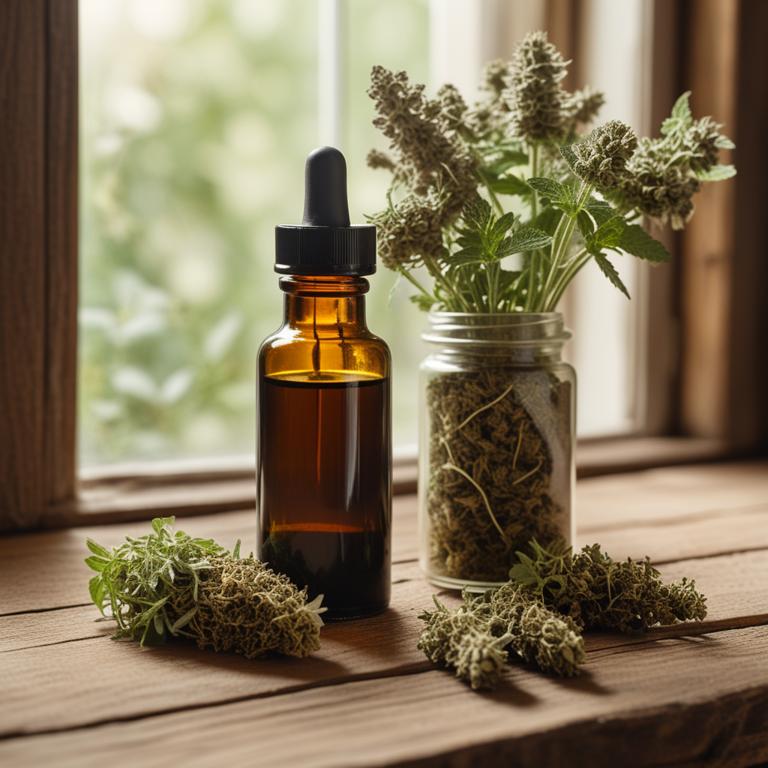
Melissa officinalis tinctures, also known as lemon balm tinctures, are a popular herbal remedy used to treat runny nose and other respiratory issues.
The antiviral and anti-inflammatory properties of Melissa officinalis help to soothe and calm the nasal passages, reducing congestion and runny nose.
The bioactive constituents, including rosmarinic acid and luteolin, have been shown to exhibit antimicrobial and antioxidant activities, which contribute to their therapeutic effects.
Regular use of Melissa officinalis tinctures can provide relief from runny nose and promote overall respiratory health, making it a valuable natural remedy for those seeking a chemical-free solution.